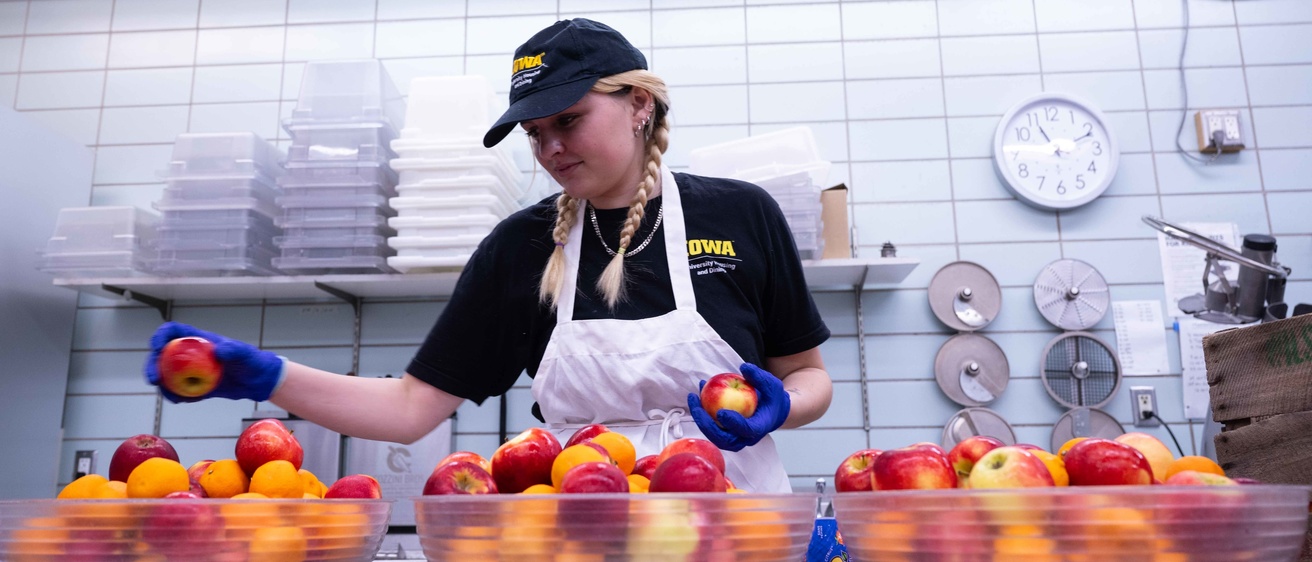Since starting her first on-campus job with University Catering a year ago, Charlotte Sears has built a community.
“My work experience is awesome,” says Sears, a second-year English and creative writing major. “I have a very strong, loving group of coworkers who make me look forward to working shifts. I mostly enjoy the fact that there is a community at my job of nonjudgmental, caring people who have truly gotten me through my first two years at the University of Iowa. If it weren't for this job, I would most likely be back in my hometown.”
Sears was one of the first participants of the Hawkeye Work Grant program, which was piloted during the 2022-23 academic year. The program provided an employment opportunity along with a $750 to $1,000 grants to first-year students with a significant amount of financial need. The grant funds – which totaled $103,884 – were in addition to other financial aid and wages the participating students earned working in UI Housing and Dining.
Data from the first year of the program shows that the 106 students who participated in the program had an average GPA of 3.08 in spring 2023 and 92.5% retention rate in fall 2023. In comparison, 1,319 first-year students who did not participate had an average GPA of 3.05 in spring 2023 and 85.1% retention rate in fall 2023.
“On-campus employment tends to be a high-impact practice for retention,” says Andrew Beckett, associate dean of University College. “One, it’s easy to find a job on campus. Two, this is a way for students to build connections with another adult on campus, as well as other students.”
In fall 2022, UI officials began to think about how the university could most effectively provide funding to help students with unpaid U-Bill balances avoid a course registration hold. Beckett approached Brenda Buzynski, assistant provost and director of student financial aid, about solutions, and she suggested what then would become the Hawkeye Work Grant program.
“We decided to encourage students, especially freshmen in need who had work-study awarded to them, to pursue opportunities to work in Housing and Dining by giving them a grant,” Buzynski says. “For Housing and Dining, it increased workforce. Students are engaged and working. It helps pay their U-Bill, and they have money for other expenses.”
The Office of the Provost provided $100,000 to fund a pilot program focused on first-year students who had been awarded work-study as part of their financial aid but still had remaining need. Some participants began their Housing and Dining jobs in the fall of 2022, while others waited until spring of 2023.
“Freshmen want a sense of belonging and affiliation with a group, maybe like they had in high school,” Buzynski says. “Now they can have a job, and they made additional friends and campus connections.”
Many students are maintaining those connections they made last year. This semester, more than 50 of the program’s original participants—now second-year students—are still working in University Housing and Dining.
Now in its second year, the program has an additional 170 students, with a goal of 200 participants before the end of the 2023-24 academic year.
Sears says the community she developed at her job kept her at the university, and many of her first friendships here were made while working.
“The program, specifically, also kept me at the University of Iowa because if it weren't for its benefits, including taking money off of tuition, I would not have been able to continue paying for my education,” she says. “The program is very important because it allows for students to continue getting their rich educations by providing money necessary for tuition, and it also provides strong communities for individuals to grow in.”
Going forward, Buzynski says hearing from student participants will be essential to ensuring the program meets their needs.
“We received positive feedback from students (last year) that were really great to read,” Buzynski says. “’I never would have worked without this opportunity.’ ‘This helped me pay for school, and I’m coming back next year.’ I think keeping the student experience at the forefront and helping students is key. Anytime we can help students stay engaged on campus, whether that’s part-time work, clubs, or organizations, it helps them build an affinity and connections.”
